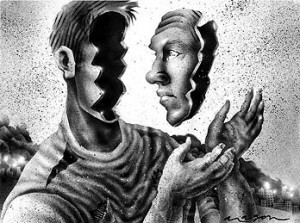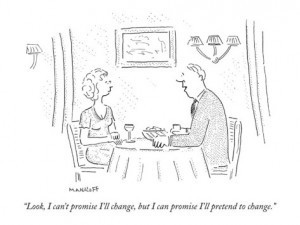Tullian Tchividjian's Blog, page 22
October 11, 2012
How Suffering Sets You Free
My friend Matt Smethurst from The Gospel Coalition interviewed me about my new book Glorious Ruin: How Suffering Sets You Free. Introducing the exchange he and I had, Matt writes:
Ever since the revolt in Eden, suffering has been inescapable. All of us live and move and have our being amid the wreckage of the Fall. Pain—universal as it is real—haunts us, stalks us, plagues us.
In his new book, Glorious Ruin: How Suffering Sets You Free (David C. Cook), Tullian Tchividjian offers a unique angle on this perennially vexing subject. Rather than focusing on the why or the how of suffering, Tchividjian zooms in on the who, demonstrating that the answer to our pain isn’t finally found in a syllogism but in a Savior—a suffering Savior.
You can read the whole thing here.
October 8, 2012
Freedom In Smallness
 The world tells us in a thousand different ways that the bigger we become, the freer we will be. The richer, the more beautiful, and the more powerful we grow, the more security, liberty, and happiness we will experience. And yet, the gospel tells us just the opposite, that the smaller we become, the freer we will be. This may sound at first like bad news, but it could not be better news!
The world tells us in a thousand different ways that the bigger we become, the freer we will be. The richer, the more beautiful, and the more powerful we grow, the more security, liberty, and happiness we will experience. And yet, the gospel tells us just the opposite, that the smaller we become, the freer we will be. This may sound at first like bad news, but it could not be better news!
In the Bible, slavery is equated with self-reliance. Self dependence, the burden of depending on yourself and controlling your circumstances to ensure meaning and security, safety and significance. But as we know, the burden of self-determination is enormous. When your meaning, your significance, your security, your protection, your safety are all riding on you, it actually feels like slavery. People seldom “choose” to embezzle money; they feel like they have to if they are to uphold whatever law they live under. That is, they equate their value with some attribute or ability—what others think of them, how much is in their bank account, their relative stature in their community—and without that attribute or ability, they cease to matter. There is no “them” without “that,” and so they do whatever they can to ensure they don’t lose it!
This is a burden we were never meant to bear, and yet after the fall, self-reliance became our default mode of operation. Mine as well as yours. You might even call it our inheritance. In our exile from Eden, we naturally tend toward self-reliance.
Fortunately, God does not leave us there. God wants to free us from ourselves, and there’s nothing like suffering to show us that we need something bigger than our abilities and our strength and our explanations. There’s nothing like suffering to remind us how not in control we actually are, how little power we ultimately have, and how much we ultimately need God. In other words, suffering reveals to us the things that ultimately matter, which also happens to be the warp and woof of Christianity: who we are and who God is.
In 1990, media mogul Ted Turner announced to an audience at the American Humanist Association that “Christianity is a religion for losers.” Instead of humbly and heartily affirming Turner’s sentiment and perhaps using it as a potential springboard for evangelism, the Christian community got angry. Even now, Turner’s judgment causes some people to bristle.
But Turner was exactly right!
The gospel is for the defeated, not the dominant. But his self-righteous tone was 100 percent wrong. That is, he was saying something true about God, but his success had clearly buffered him from understanding himself honestly and accurately. In view of God’s holiness, we are all losers (Rom. 3:23). We are all sufferers. We are all sinners. The distinction between winners and losers is irrelevant when no one can claim victory.
Instead, the gospel is for those who have realized that they can’t carry the weight of the world on their shoulders. Only when God drives us to the end of ourselves do we begin to see life in the gospel. Which is another way of saying that only those who stand in need of a savior will look for or recognize a savior. Fortunately, Christianity in its original, most authentic expression understands God chiefly as savior and human beings chiefly as those in need of being saved.
(Excerpted from my new book Glorious Ruin: How Suffering Sets You Free)
October 4, 2012
The Tower Of Babel
Believe it or not, the familiar story of the Tower of Babel teaches us more than we ever thought about the nature of sin, God’s grace, and the reality of descending one-way love. It’s the entire message of the Bible in a nutshell.
In The Beginning…Grace Part 6 | Tullian Tchividjian from Coral Ridge | LIBERATE on Vimeo.
October 1, 2012
The Freedom Of Defeat
(Today is an exciting day for me. My new book, Glorious Ruin: How Suffering Sets You Free, is officially released. It is the most important book I’ve written so far. The excerpt below may be the most vivid illustration in the book of how suffering can set you free.)
 I heard something on the radio recently that made me pull my car over to the side of the road. A young woman named Sara was telling the story of her family’s very public fall from grace. She grew up in a privileged family—enormous house, beautiful clothes, expensive cars (and schools), and country club memberships. Everything in her life growing up was very prim and proper. But Sara claimed that despite the excess that could be seen from the outside, on the inside, her home environment was one of constraint:
I heard something on the radio recently that made me pull my car over to the side of the road. A young woman named Sara was telling the story of her family’s very public fall from grace. She grew up in a privileged family—enormous house, beautiful clothes, expensive cars (and schools), and country club memberships. Everything in her life growing up was very prim and proper. But Sara claimed that despite the excess that could be seen from the outside, on the inside, her home environment was one of constraint:
Rules were very important. Etiquette, very important. And my dad’s insane temper could be set off by the slightest offense. When I heard the Porsche rumble up the driveway every day when he came home, I would run into my room and hide. Because maybe today would be the day he found the candy wrapper in the sofa cushion…. It was all just all about avoiding awakening the bee’s nest.
Sara went on to describe the fateful day when her parents called a family meeting to tell the children that her father had done something very wrong and was going to have to pay. He embezzled much of their money, it turned out, from a trust fund of one of his disabled clients. In other words, he stole it. Her father, who was a prominent lawyer, wept on the couch as he confessed his wrongdoing to his children. The guilt-induced suffering became too much to bear. He couldn’t live with his wrongdoing any longer. “We’re going to have to start over. We are going to rebuild our lives.” Sara then shared how her father was disbarred from practicing law, how they had to sell their house and cars and move to the other side of town. Her mother went to work. The scandal made headlines. At school, kids teased Sara for being the daughter of a “bankrobber.” And yet in that death—of security, wealth, achievement, identity, etc.—we find out that new life is born.
The radio commentary described it this way:
But my dad was instantly better…. He was happy. He chewed gum, which didn’t happen before. And wasn’t such an … all the time.
Commenting on this story, Ethan Richardson wrote:
With less money, the family gave more. With less status, they imputed status upon those who had none. In becoming the judged, they relinquished their judgments. Downward mobility was now the name of the game: the formerly constrained household became a “free for all.”… In being freed from their bondage to the law of progress and upward mobility, Sara’s family was now able to live in the reality of downward-directed love.
Wow.
Sara’s story is a powerful testimony of how suffering can liberate us, a tangible echo of the theology of the cross. The suffering of Sara’s father was self-inflicted, as much suffering is, but there was nothing minimal about it. There is zero sense that he viewed his crisis as an avenue for personal growth. And yet real transformation did happen! The disaster actually freed him from himself: from his attachment to his possessions (and affections), from his obsession with appearances, from his judgments of others, from his need to remain upwardly mobile, and the list goes on.
Failure, it turns out, was his gateway to freedom.
September 28, 2012
Grace Always Comes As A Contradiction
 God’s grace always, always, always comes as a contradiction to what makes natural sense to us–it always comes as a but, not a therefore.
God’s grace always, always, always comes as a contradiction to what makes natural sense to us–it always comes as a but, not a therefore.
The wages of sin is death…BUT the gift of God is eternal life. (Rom. 6)
We were dead in our trespasses and sin…BUT God made us alive. (Eph. 2)
By works of the law no flesh will be justified before God…BUT now the righteousness of God has been revealed…(Rom. 3)
Not long ago a gentleman approached me after a talk I had delivered and said, “I’m 60 years-old and have had great success as a businessman and I’m here to tell you from experience that grace doesn’t work in this world.” My immediate response was, “Well maybe it appears that way only because grace isn’t from this world.”
This quote from Robert Kolb makes the point beautifully:
God promises righteousness and freedom to sinners. That promise contradicts ordinary human expectation. Sinners ought to receive punishment rather than pardon, incarceration rather than freedom. But by the double work of his law and gospel, God teaches sinners to close their eyes to ordinary human expectations and the conclusions of common sense and to open their ears to the promise which offers life and freedom.
September 24, 2012
A Barrier To Honesty
 One of the chief vehicles for dishonesty in my own life has been my involvement in “accountability groups.”
One of the chief vehicles for dishonesty in my own life has been my involvement in “accountability groups.”
For those who have been spared them, an “accountability group” is a single-sex small-group Bible study on steroids. A group of friends arrange for a time each week to get together, ostensibly to encourage one another by upholding standards of personal righteousness in a confidential context. Instead, the members spend most of the time picking each other apart, uncovering layer after layer after layer of sin in a coercive and sometimes even competitive fashion. You confess your sin to your friends and they to you, and at first it’s a relief. Light shines into dark corners, and you pray honestly for the first time in ages. You may even find yourself a bit less drawn to whatever behavior brought you to the group in the
first place.
As the weeks wear on and you find that your victory was more short lived than you had initially hoped, perhaps you start to embellish or hold back in order to concoct some narrative of improvement. Or perhaps you remain entirely truthful, but your friends begin to doubt your sincerity. Soon nothing is enough; no matter what you unveil, they look for you to uncover something deeper, darker, and more embarrassing than what you’ve already shared. You start to embellish in the other direction–making things seem worse than they are to satisfy the probing inquisitiveness of your friends. Eventually everyone is investigating one another, and no one is telling the truth.
Well, I can’t stand those groups!
Setting aside the obvious objection that Christ settled all our accounts, once for all, such groups inevitably start with the narcissistic presupposition that Christianity is all about cleaning up and doing your part. These groups focus primarily (in my experience, almost exclusively) on our sin, and not on our Savior. Because of this, they breed self-righteousness, guilt, and the almost irresistible temptation to pretend, or to be less than honest. Little or no attention is given to the gospel. There’s no reminder of what Christ has done for our sin—cleansing us from its guilt and power—and of the resources that are already ours by virtue of our union with Him. These groups thrive, either intentionally or not, on a “do more, try harder” moralism that robs us of the joy and freedom Jesus paid dearly to secure for us. When the goal becomes conquering our sin instead of soaking in the conquest of our Savior, we actually begin to shrink spiritually. Sinclair Ferguson rightly pointed this out:
Those who have almost forgotten about their own spirituality because their focus is so exclusively on their union with Jesus Christ and what He has accomplished are those who are growing and exhibiting fruitfulness. Historically speaking, whenever the piety of a particular group is focused on OUR spirituality that piety will eventually exhaust itself on its own resources. Only where our piety forgets about itself and focuses on Jesus Christ will our piety [be] nourished by the ongoing resources the Spirit brings to us from the source of all true piety, our Lord Jesus Christ.
The tragic irony in all of this is that when we focus so strongly on our need to get better, we actually get worse. We become even more neurotic and self-absorbed. Preoccupation with our guilt (instead of God’s grace) makes us increasingly self-centered and morbidly introspective. And what is Original Sin if not a preoccupation with ourselves?
Make no mistake, we need loving friends to point out ways in which we’re settling for less–we need the help of our community to help us see our idols and the various ways that we are trusting in something or someone smaller than Jesus to satisfy our deepest longings and needs. But what needs to be ultimately rooted out and attacked is the sin underneath my sins which is not immoral behavior but immoral belief—faith in my own moral and spiritual “progress,” rather than in the One who died to atone for my lack of progress.
Listen carefully: Christianity is not first and foremost about our behavior, our obedience, our response, and our daily victory over sin—as important as all these are. It is not first and foremost about us at all–it is first and foremost about Jesus! It is about His person; His substitutionary work; His incarnation, life, death, resurrection, ascension, and promised return. We are justified—and sanctified—by grace alone through faith alone in the finished work of Christ alone. Even now, the banner under which Christians live reads, “It is finished.” Everything we need, and everything we look for in things smaller than Jesus, is already ours in Christ.
So I’m all for accountability–but a certain kind. The accountability we really need is the kind that corrects our natural tendency to dwell on me—my obedience (or lack thereof ), my performance (good or bad), my holiness— instead of on Christ and His obedience, His performance, and His holiness for me. It sometimes seems that we can’t help ourselves from turning the good news of God’s grace into a narcissistic program of self-improvement. We try to turn grace into law, in other words. We need to be held accountable for that!
The gravitational pull of conditionality is so strong, our hard-wiring for law so ingrained, that we need real friends to remind us of the good news every day. In fact, our lives depend on it! So instead of trying to fix one another, perhaps we might try “stirring one another up to love and good deeds” by daily reminding one another, in humble love, of the riches we already possess in Christ.
(Excerpted from Glorious Ruin: How Suffering Sets You Free pg. 80-83)
September 19, 2012
The Man At The Bottom
 Contrary to popular belief, Christianity is not about good people getting better. If anything, it is about bad people coping with their failure to be good. That is to say, Christianity concerns the gospel, which is nothing more or less than the good news that “Christ Jesus came into the world to save sinners” (1 Tim. 1:15). “[Christ] was delivered over to death for our sins and was raised to life for our justification” (Rom. 4:25). The gospel is a proclamation that always addresses sinners and sufferers directly (i.e., you and me).
Contrary to popular belief, Christianity is not about good people getting better. If anything, it is about bad people coping with their failure to be good. That is to say, Christianity concerns the gospel, which is nothing more or less than the good news that “Christ Jesus came into the world to save sinners” (1 Tim. 1:15). “[Christ] was delivered over to death for our sins and was raised to life for our justification” (Rom. 4:25). The gospel is a proclamation that always addresses sinners and sufferers directly (i.e., you and me).
The prevailing view in much of contemporary Christianity is more subjective. It tends to be far more focused on the happiness and moral performance of the Christian than the object of faith, Christ Himself.
Think about it: How often have you heard the gospel equated with a positive change in a believer’s life? “I used to __________, but then I met Jesus and now I’m ___________.” It may be unintentional, but we make a serious mistake when we reduce the good news to its results, such as patience, sobriety, and compassion, in the lives of those who have heard it. These are beautiful developments, and they should be celebrated. But they should not be confused with the gospel itself. The gospel is not a means to an end, it is an end in itself.
What happens in this scheme is the following: well-meaning Christians adopt a narrative of improvement that becomes a law (or an identity, which is often the same thing) through which we filter our experiences. The narrative can be as simple as “I was worse, but now I am better,” or as arbitrary as “I used to have a difficult relationship with my mother, but now it’s much easier.” Soon we wed our faith to these narratives, and when an experience or feeling doesn’t fit—for example, when we have a sudden outburst of anger at someone we thought we had forgiven—we deny or rationalize the behavior.
If the narrative we’ve adopted says that in order for our relationship with God to be legitimate, our life has to get better, we set up an inescapable conflict, or what social scientists call “cognitive dissonance.” When our view of ourselves is at risk, honesty is always the first casualty. That is, when the gospel is twisted into a moral improvement scheme, (self-)deception is the foregone conclusion.
 There’s a classic New Yorker cartoon of a man sitting down with a woman, having dinner, saying to her, “Look, I can’t promise I’ll change, but I can promise I’ll pretend to change.” I hope that line doesn’t characterize your church, but it does characterize more churches than you think. Instead of a hospital for sufferers, church becomes a glorified costume party, where lonely men and women tirelessly police each other’s facade of holiness. The higher up in the pecking order, the less room for weakness. Perhaps it should come as no surprise when we read headlines of pastors of legalistic churches acting out in self-destructive ways (Rom. 5:20).
There’s a classic New Yorker cartoon of a man sitting down with a woman, having dinner, saying to her, “Look, I can’t promise I’ll change, but I can promise I’ll pretend to change.” I hope that line doesn’t characterize your church, but it does characterize more churches than you think. Instead of a hospital for sufferers, church becomes a glorified costume party, where lonely men and women tirelessly police each other’s facade of holiness. The higher up in the pecking order, the less room for weakness. Perhaps it should come as no surprise when we read headlines of pastors of legalistic churches acting out in self-destructive ways (Rom. 5:20).
God is not interested in what you think you should be or feel. He is not interested in the narrative you construct for yourself, or that others construct for you. He may even use suffering to deconstruct that narrative. Rather, He is interested in you, the you who suffers, the you who inflicts suffering on others, the you who hides, the you who has bad days (and good ones). And He meets you where you are. Jesus is not the man at the top of the stairs; He is the man at the bottom, the friend of sinners, the savior of those in need of one. Which is all of us, all of the time.
(Excerpted from Glorious Ruin: How Suffering Sets You Free, pg. 78-80)
September 15, 2012
Rethinking The Christian Life
This past week I had the privilege of, once again, speaking at Liberty University’s Convocation (North America’s largest weekly gathering of Christian students). I love the students there.
Assuming that many of them grew up, like I did, thinking that the focus of the Christian faith was the life of the Christian, my goal was to remind them that this whole thing is riding on Jesus’ work for us, not our work for him. In fact, I told them that the way many of us think about sanctification is not very sanctified–it’s downright narcissistic. We think way too much about how we’re doing, if we’re growing, whether we’re doing it right or not. We spend too much time brooding over our failures and reflecting on our successes. I admitted that the more I focus on my need to get better, the worse I actually get. I become self-absorbed–the exact opposite of how the Bible describes what it means to be sanctified.
I reminded them that spiritual growth is realizing how utterly dependent we are on Christ’s cross and mercy–It’s not arriving at some point where we need Jesus less and less because we’re getting better and better.
In short, when we stop focusing on our need to get better, that’s what it means to get better. When we stop obsessing over our need to improve, that’s what it means to improve!
Check it out…
September 12, 2012
Freed From The Prison Of Why
 There’s no doubt, the Why questions of suffering are utterly perplexing. And as we search the Scriptures and consider stories such as Job’s, we are tempted to see those as worst-case scenarios designed to help us get our heads straight in relation to our comparatively small “first world” problems. We look for ways to manage pain. We medicate; we minimize; we moralize. We rage, and we run. We develop theories to explain what is happening to us. While they may temporarily help us categorize and compartmentalize our thoughts and feelings, when true suffering comes, all our speculations fall flat. The Why’s of suffering keep us shrouded in a seemingly bottomless void of abstraction where God is reduced to a finite ethical agent, a limited psychological personality, whose purposes measure on the same scale as ours.
There’s no doubt, the Why questions of suffering are utterly perplexing. And as we search the Scriptures and consider stories such as Job’s, we are tempted to see those as worst-case scenarios designed to help us get our heads straight in relation to our comparatively small “first world” problems. We look for ways to manage pain. We medicate; we minimize; we moralize. We rage, and we run. We develop theories to explain what is happening to us. While they may temporarily help us categorize and compartmentalize our thoughts and feelings, when true suffering comes, all our speculations fall flat. The Why’s of suffering keep us shrouded in a seemingly bottomless void of abstraction where God is reduced to a finite ethical agent, a limited psychological personality, whose purposes measure on the same scale as ours.
But since no one alive can see the beginning from the end, from the divine vantage point, we’re left stranded in a prison of inscrutability. And sadly, we often prefer our confinement to the disorienting possibility that our suffering is actually ordained, that God is involved in it. Ray Ortlund said:
When the righteous cannot connect the realities of their experience with the truths of God, then God is calling them to trust him that there is more to it than they can see. As with Job, there is a battle being fought in the heavenlies. Trust in God, not explanations from God, is the pathway through suffering.
Fortunately, we worship a God who is in the business of freeing captives and creating trust where there was none before. In fact, the cross tells us that He does so (and has done so) through suffering, not despite it.
Grace is available because Jesus went through the valley of the shadow of death and rose from death. The gospel engages our life with all its pain, shame, rejection, lostness, sin, and death. So now, to your pain, the gospel says, “You will be healed.” To your shame, the gospel says, “You can now come to God in confidence.” To your rejection, the gospel says, “You are accepted!” To your lostness, the gospel says, “You are found and I won’t ever let you go.” To your sin, the gospel says, “You are forgiven and God declares you pure and righteous.” To your death, the gospel says, “You once were dead, but now you are alive. (Justin Holcomb)
And let us not forget our friend Job, who was refused his Why so that he might recognize the Who. Oddly enough, even Job’s story testifies to the truth of that blessed little formula: Jesus plus nothing equals everything. Our hope is not Jesus plus an explanation as to why suffering happens or Jesus plus an explanation as to why your child or spouse is so difficult, why the cancer hasn’t gone into remission, why finances continue to be so tight. Thomas Merton once said, “The truth that many people don’t understand, until it is too late, is that the more you try to avoid suffering, the more you suffer, because smaller and more insignificant things begin to torture you in proportion to your fear of being hurt.”
 Think about it for a moment: What is that thing in your life that if God were to take it away, you’d feel like life was not worth living? When we’re able to answer that question, we will figure out what we are really worshipping, and what, by definition, might lie at the root of our suffering. It could be our children, our spouse, an ambition, or a dream of financial success. Those good gifts God gave us for our enjoyment that we have turned into idols. Suffering is often the process of these things being stripped away. Indeed, there is nothing like suffering to remind us how much we need God. What good news that His purpose and plan for our lives moves in a different direction from ours!
Think about it for a moment: What is that thing in your life that if God were to take it away, you’d feel like life was not worth living? When we’re able to answer that question, we will figure out what we are really worshipping, and what, by definition, might lie at the root of our suffering. It could be our children, our spouse, an ambition, or a dream of financial success. Those good gifts God gave us for our enjoyment that we have turned into idols. Suffering is often the process of these things being stripped away. Indeed, there is nothing like suffering to remind us how much we need God. What good news that His purpose and plan for our lives moves in a different direction from ours!
The good news of suffering is that it brings us to the end of ourselves—a purpose it has certainly served in my life. It brings us to the place of honesty, which is the place of desperation, which is the place of faith, which is the place of freedom. Suffering leaves our idols in pieces on the ground. It puts us in a position to see that God sent His Son not only to suffer in our place but also to suffer with us. Our merciful friend has been through it all. He is with us right now! And while He may not deliver us from pain and loss, He’ll walk with us through it. That is simply Who He is.
For we do not have a high priest who is unable to sympathize with our weaknesses, but we have one who has been tempted in every way, just as we are—yet was without sin. Let us then approach the throne of grace with confidence, so that we may receive mercy and find grace to help us in our time of need. (Heb. 4:15-16)
(Excerpted from my forthcoming book Glorious Ruin: How Suffering Sets You Free)
September 7, 2012
Theological Dictionary
 One of my favorite features over at the LIBERATE website is a developing theological dictionary. It’s an important thing for Christian’s to know what they believe and why they believe it. Lord Byron said, “Words are things, a small drop of ink falling like dew upon a thought, producing that which makes thousands, perhaps millions, think.”
One of my favorite features over at the LIBERATE website is a developing theological dictionary. It’s an important thing for Christian’s to know what they believe and why they believe it. Lord Byron said, “Words are things, a small drop of ink falling like dew upon a thought, producing that which makes thousands, perhaps millions, think.”
So each Friday, my friend Dr. Jono Linebaugh (Content Manager of LIBERATE and Professor of New Testament at Knox Theological Seminary) will be writing and posting short definitions of key words and concepts that are at the core of LIBERATE’s message. Terms and phrases like “law and gospel,” “justification,” “the theology of the cross,” “grace,” “two kinds of righteousness,” and much more will be presented and explained.
The purpose of this “theological dictionary” is not to offer the last word on these important terms and phrases. Rather, our hope is to offer a “first word”–that is, to introduce and concisely explain some of the ideas that have been central to the Christian faith throughout history.
You can find Jono’s introduction to the theological dictionary here.
The first entry (posted today) strikes at the very center of what LIBERATE is all about: Law and Gospel.
As Gerhard Ebeling said, “The failure to distinguish the law and the gospel always means the abandonment of the gospel.” A confusion of law and gospel is the main contributor to moralism in the church simply because the law gets softened into “helpful tips for practical living”, instead of God’s unwavering demand for absolute perfection. While the gospel gets hardened into a set of moral and social demands that “we must live out”, instead of God’s unconditional declaration that “God justifies the ungodly.” In other words, “God doesn’t serve mixed drinks. The divine cocktail is not law mixed with gospel. God serves two separate shots: law then gospel.”
Read Jono’s incredibly helpful entry here.
Tullian Tchividjian's Blog
- Tullian Tchividjian's profile
- 142 followers



